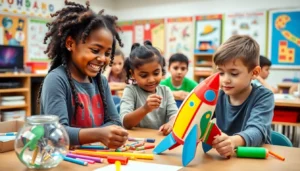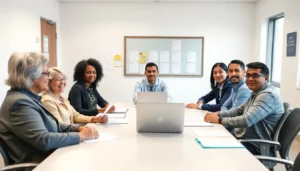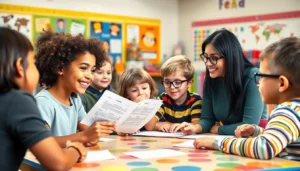Table of Contents
ToggleImagine a classroom where kids aren’t just sitting quietly at their desks, but exploring, creating, and even negotiating their own learning paths. Welcome to the world of Montessori elementary schools, where education transforms into an adventure. These vibrant environments encourage curiosity and independence, making learning feel less like a chore and more like a treasure hunt.
Overview Of Montessori Elementary School
Montessori elementary schools focus on personalized learning experiences. They encourage students to explore topics at their own pace. Emphasis lies on hands-on learning through various materials and activities. Students engage in collaborative work with peers, enhancing social skills and teamwork.
Curriculum integrates subjects like math, science, and language arts into cohesive lessons. For instance, students may learn geography through map-making projects. A key feature includes mixed-age classrooms, fostering mentorship and leadership among different age groups.
Teachers act as guides rather than traditional instructors. They observe students’ interests, then provide resources to further explorations. This method allows each child’s unique learning style to thrive in a supportive environment.
Assessment differs from conventional systems, focusing on individual progress rather than standardized tests. Teachers document growth through portfolios that capture a child’s journey.
Parents often participate in the learning process, attending workshops and volunteer opportunities. This collaborative approach strengthens the school community. Montessori elementary schools cultivate a love for learning that extends beyond the classroom, promoting lifelong educational values.
Educational Philosophy
Montessori education embodies a unique philosophy that emphasizes student-centered learning. This approach encourages children to take ownership of their education through exploration and inquiry.
Key Principles
Montessori schools prioritize independence, allowing children to make choices about their learning. This freedom fosters self-discipline and responsibility. The curriculum integrates subjects into interconnected lessons, offering insights that deepen understanding. Multi-age classrooms encourage peer learning, enabling older students to mentor younger ones. Such interactions build a community of respect and collaboration. Engaging materials and activities support active learning, catering to various learning styles. Teachers design environments that spark curiosity and invite exploration.
Role of the Teacher
Teachers serve as facilitators in Montessori classrooms. They observe students, guiding them toward resources that align with their interests. This observational role helps identify unique learning paths for each child. Rather than delivering lectures, teachers encourage hands-on experiences that promote critical thinking. They foster independence by allowing students to pursue topics at their own pace. Continuous assessment includes maintaining portfolios that document progress. Communication with parents strengthens the learning community, creating a supportive environment for children.
Curriculum Characteristics
Montessori elementary schools offer a unique curriculum that emphasizes active participation and holistic learning. Key aspects include hands-on experiences and a multidisciplinary approach that fosters a deep understanding of concepts.
Hands-On Learning
Hands-on learning forms the foundation of the Montessori curriculum. Students engage with materials that cater to various learning styles, such as manipulatives for math and science experiments. This interactive method sparks curiosity, encouraging exploration and problem-solving. Practical activities make abstract concepts tangible. Additionally, real-world applications reinforce knowledge retention and make learning relevant. Through this experiential approach, children gain confidence in their abilities while developing critical thinking skills.
Multidisciplinary Approach
The multidisciplinary approach integrates subjects seamlessly. Geography lessons might involve creating maps, while history projects can link to art and cultural studies. Such connections help students understand how different disciplines relate. This integrated curriculum promotes a well-rounded education, preparing children for future academic challenges. Children develop the ability to think critically across various subjects by exploring interconnected concepts. Furthermore, collaboration with peers enhances social skills and teamwork, enriching the overall learning experience.
Classroom Environment
Montessori elementary schools create spaces that promote exploration and independence. Each classroom is thoughtfully arranged to enhance learning opportunities, encouraging students to engage with materials that resonate with their interests.
Prepared Environment
Prepared environments play a vital role in Montessori settings. Each space features accessible, age-appropriate materials designed for hands-on learning. Students choose activities, fostering autonomy and self-directed exploration. Careful attention to aesthetic elements creates a welcoming atmosphere, inspiring curiosity and creativity. Natural materials often replace plastic ones, aligning with Montessori principles of fostering respect for nature. Orderly arrangements and clear organization help students develop responsibility and independence while managing their learning experiences.
Role of Peers
Peers significantly enhance the learning experience in Montessori classrooms. Students work collaboratively, sharing knowledge and skills through peer-to-peer interactions. Mixed-age groups allow older students to mentor younger ones, reinforcing leadership and accountability. Cooperative projects cultivate teamwork and social skills, enriching students’ relationships. In such an environment, children learn from one another, fostering a sense of community. Collaborating with peers encourages problem-solving and critical thinking, essential skills for their future endeavors. Overall, these interactions drive engagement, making learning an enjoyable and shared journey.
Benefits of Montessori Education
Montessori education offers numerous advantages, promoting a holistic approach to learning. This system emphasizes active engagement and self-directed exploration.
Critical Thinking Skills
Students develop critical thinking skills through problem-solving activities. They encounter real-world challenges that require innovative solutions. Engaging with hands-on materials enhances their analytical abilities. As children explore various subjects, they learn to evaluate information critically. This approach prepares them to tackle complex issues independently. Support from teachers acts as a catalyst, guiding students toward deeper understanding.
Social and Emotional Development
Social and emotional development thrives in Montessori classrooms. Mixed-age groups foster collaboration and mentorship, allowing older students to lead by example. Children learn empathy and respect through peer interactions. Additionally, working together on projects strengthens their communication skills. These experiences cultivate a strong sense of community, promoting accountability and cooperation. Montessori education nurtures resilience, shaping well-rounded individuals capable of navigating social dynamics effectively.
Montessori elementary schools offer a transformative educational experience that prioritizes the individual needs of each child. By fostering independence and encouraging exploration students develop essential skills that prepare them for future challenges. The emphasis on hands-on learning and collaboration not only enhances academic growth but also nurtures social and emotional development.
In these environments children learn to take ownership of their education while building meaningful relationships with peers and teachers. The unique curriculum and mixed-age classrooms create a vibrant community where curiosity thrives. Montessori education equips students with the tools they need to navigate the complexities of life and instills a lifelong love of learning.






